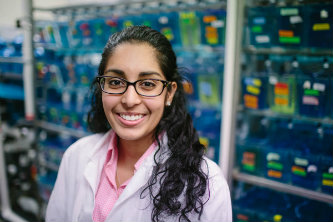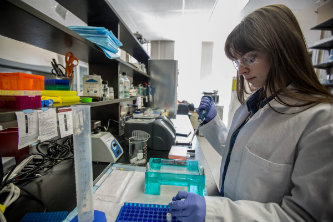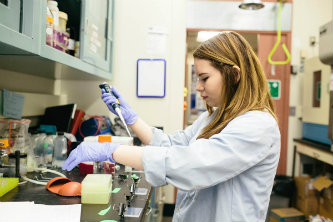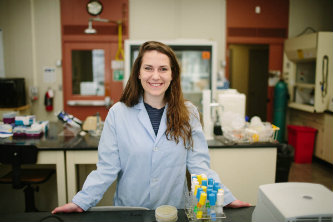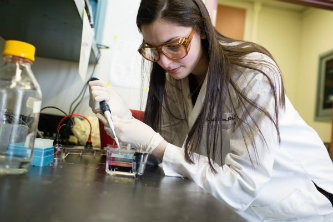Seizing opportunities, opening doors
Lehigh's department of biological sciences allows students to immerse themselves in research.
“You really never know when a new passion might be unearthed,” says Emily Heckman ’16. “That’s sort of what happened to me in research.”
Heckman, a molecular biology major, unearthed her passion by taking full advantage of the wealth of research opportunities that Lehigh offers its undergraduates.
“I tried something new and now want to make a career out of it,” says Heckman. “There are so many opportunities around campus to get plugged in or involved one way or another, and just taking that first step is what can really change things.”
Lehigh’s department of biological sciences encourages students to take that first step. As a result, Heckman and fellow undergraduate researchers Kyra Feuer ’16, Michelle Juarez ’16, Jasmine Singh ’16 and Rachel Sternberg ’16 arrived at Lehigh and jumped right in. So far they’ve learned not only a great deal about research, but also quite a bit about themselves and their potential beyond Lehigh.
Enhancing science education
Lehigh’s department of biological sciences includes the university’s largest number of students involved in independent study and honors research with faculty. The department also has the largest number of science majors at the university, of which over 60 percent are women. The department’s dedication to innovation in life science education and student growth has earned it multiple grants from the Howard Hughes Medical Institute (HHMI), the premier medical research philanthropy founded by industrialist and aviator Howard Hughes. HHMI’s mission is to “advance biomedical research and science education for the benefit of humanity.” In the three most recent competitions (2006, 2010 and 2014) among major research universities, HHMI awarded Lehigh more than $5 million in Biological Science Education grants to support interdisciplinary curriculum development, course-based research experiences, expanded research-intensive opportunities for undergraduates, and programs designed to increase success rates in Science, Technology, Engineering, and Mathematics among members of under-represented and at-risk students .
Among Lehigh’s HHMI programs is SEA-PHAGES (The Science Education Alliance’s Phage Hunters Advancing Genomics and Evolutionary Science), a two-semester course that immerses students in authentic research experiences. During the course, which starts in the spring of the first year, students isolate, name, sequence and analyze newly discovered mycobacteriophages, which are viruses that infect mycobacteria, some of which cause tuberculosis. Undergraduates learn to work and think as scientists and acquire a variety of techniques that span disciplines including microbiology, molecular biology, genomics and bioinformatics.
Heckman, Juarez and Sternberg were interested in the biological sciences as first-year students and signed up for the SEA-PHAGES course with Vassie Ware, professor of molecular biology, during their second semester. Feuer signed on at the start of her sophomore year.
“I think it’s phenomenal,” says Juarez, who is majoring in behavioral neuroscience, of SEA-PHAGES. “Every experiment I ran, I knew was for a purpose. The experiments I had to conduct were never pre-determined by someone else for me. I had to determine next experimental steps based on what I had learned from my own research. ”
“I was just blown away by how much I loved it,” says Feuer, a behavioral neuroscience and psychology major. “[SEA-PHAGES] was the first time I got to do research. There weren’t any answers yet to the questions we were asking. I absolutely loved it and didn’t want to stop.”
For these students, SEA-PHAGES provided an invaluable gateway into research. Each student has since pursued independent research-for-credit opportunities during the academic year, and all have extended their experience with summer research opportunities both on- and off- campus.
‘The questions never really end.’
“I’d never worked in a lab before,” says Emily Heckman of SEA-PHAGES. “One thing I learned in going through [the course] was that the questions really never end. You answer one question and it leads to new questions. It’s really a cycle that self-perpetuates. I really loved it.”
Heckman also participated in Lehigh’s innovative Mountaintop initiative last summer, which, she says, “solidified everything.” The project integrated molecular biology and bioengineering principles to combat pathogenic bacteria. Heckman and her team sought to identify the functions of genes from viruses and bacteriophages and aimed to use them as a therapy to degrade pathogen-causing bacteria that cause diseases such as tuberculosis and listeriosis.
“It was a really cool undertaking getting to work with bioengineering and materials scientists and learning their perspectives on the same problem,” says Heckman, who hopes to eventually complete a Ph.D. program and lead her own research lab. “It really gave me an appreciation for the importance of an interdisciplinary approach to complex problems in life science. You have to have people who specialize in other areas to open your eyes to different perspectives and analytical methods.”
Providing interdisciplinary perspectives within the biological sciences curriculum has not only influenced research opportunities for students, but has also influenced development of the biological sciences curriculum as well.
‘My own seat at the bench’
While still in the SEA-PHAGES class as a sophomore, Kyra Feuer, already hooked, reached out to faculty members for additional research opportunities. Greg Lang, assistant professor of molecular biology, hired Feuer as a work-study student in his lab, where she studied yeast evolution.
“I got my own seat at the bench, which was really cool,” says Feuer.
In addition to her work with Lang, Feuer chose to continue with her phage research and registered for supervised research in the Ware Lab. Seeking even more variety, Feuer applied and was accepted to the Biosystems Dynamic Summer Institute (BDSI), one of the HHMI-funded initiatives at Lehigh. Assigned to the team led by Julie Miwa, assistant professor of neuroscience, and Amber Rice, assistant professor of evolutionary biology, Feuer worked in the lab full time, studying a family of genes known as lynx, which influence learning and anxiety. She has continued her research on lynx during the academic year and hopes to do similar work through a Mountaintop project this summer.
“I had been doing research during the school year, but there’s a big difference between going to the lab a few hours a week between classes and actually spending 40 hours a week working on it full time,” says Feuer. “I absolutely loved it. I knew for sure I wanted to go to grad school and do research for life.”
Feuer, who is interested in the genetics of abnormal behavior, chose to continue her work with the lynx gene beyond the summer program. She currently studies lynx1, the gene that can cause differences in learning potential in different people. “We’re trying to understand why some people learn more effectively than others,” says Feuer, who plans to expand her work to include lynx2, the anxiety gene, for her senior thesis.
“I’m the type of person that really needs a problem to solve,” says Feuer. “It’s so much more exciting when you’re actually using [knowledge] in real life to solve problems that no one knows the answer to.”
‘Immerse yourself as much as you can’
SEA-PHAGES had a particularly significant impact on Michelle Juarez: “I am so glad I did it because, to be honest, I don’t know if I’d even be doing research if I’d never done that program.”
Following the course, Juarez has continued during the academic year to work with Ware, studying gene functions that are unknown in certain classes of mycobacteriophages. She is attempting to discover the function of gene gp57 (which is found in only one group of related bacteriophages) in order to determine how this gene affects bacteriophage infection and killing of its host.
After completing the SEA-PHAGES course, Juarez was also nominated for and accepted by the HHMI Exceptional Research Opportunities Program (EXROP) fellowship, which provides summer research experiences to undergraduate students who are from disadvantaged backgrounds or from groups traditionally underrepresented in the sciences. Through EXROP, Juarez spent ten weeks last summer studying the retina in the lab of Constance Cepko, professor of genetics at Harvard Medical School. Juarez will return to Harvard this summer to complete her research.
Juarez plans to attend an M.D. /Ph.D. program and eventually work in global medicine and policy development. She advises other students to take advantage of the opportunities available to them.
“Immerse yourself as much as you can,” says Juarez. “If you know what you want to do, try and get involved. You have to be proactive. I knew I wanted to do research, so I got involved right away in whatever way I could.”
‘Masters of the topic we’re researching’
SEA-PHAGES allowed Rachel Sternberg to “really get my hands wet and try different things. I really loved it and I’ve been [in the lab] ever since.”
Today, Sternberg works with yeast in the lab of Robert Skibbens, professor of cell biology. She focuses on Eco1, a cell cycle gene required for cohesion around sister chromatids. Mutations in Eco1 produce cells that are a hallmark of cancer progression. Sternberg is studying the regulation of cohesion factors that respond to DNA damage that, if left unrepaired, would result in new mutations.
“We are really getting that full research experience,” says Sternberg, who plans to attend medical school and become a pediatrician. “We’re not just following a grad student—we’re the ones who are the masters of the topic we’re researching. That’s amazing.”
Sternberg’s passion for her work is just as evident when things don’t go according to plan as when they do.
“Two semesters ago I started doing one project, went down one path and realized it was not working the way we had expected. I backtracked a step, found a solution, and now I’m still following that same path,” says Sternberg.
“I think that’s part of research. I think you learn as much just from a dead end that you do from a positive experiment.”
‘Different ways to move toward the same goal’
Jasmine Singh, a biochemistry major, did not take the SEA-PHAGES course. Instead, she chose a lab course based on the work she’d eventually do in the developmental biology lab of Kathy Iovine, associate professor of microbiology. Singh’s current independent research in the Iovine Lab has her studying the effects of the extracellular matrix on cell proliferation and differentiation using AB9 cells, an immortalized fibroblast cell line derived from the zebrafish regenerating fin.
“There’s a mixture of undergrads and grads in the lab and everyone is really friendly,” says Singh, who takes advantage of the knowledge and experience of graduate students whenever she can. “[They’re] so helpful when I ask questions about what they’re working on or a procedure.”
Like Feuer, Singh participated in the BDSI program, which allowed her to continue in the Iovine Lab last summer. During BDSI, Singh worked in collaboration with the bioengineering-focused Berger Lab on a project related to her independent research.
“It was really cool to see how the two fields of bioengineering and developmental biology overlapped. It was really enriching.”
“I’ve been exposed to so many different ways to approach the same problem,” says Singh, who plans to study medicine. “You can read in a textbook that there are multiple ways to move toward the same goal, but actually seeing different strategies at work in the lab has had a strong impact on my perspective.”
A firm grounding
In offering these unique research experiences, Lehigh has provided a world of possibility for each of these students.
“I’m really glad I ended up [at Lehigh] because I feel like I’ve gotten so much more out of my college experience than I would have anywhere else,” says Singh. “I didn’t expect to be doing research. I didn’t expect to be finding out anything. To be able to do it is rewarding.”
“All my experiences at Lehigh have built me into a confident scientist who can function independently in a lab,” says Heckman. “It’s groomed me for what’s to come. I’m definitely not done growing, but I think I have a solid foundation now because of the education I’ve received at Lehigh.”
“There are so many doors that have been opened for me instead of just coming here and going to class and leaving class,” says Sternberg. “The opportunities are endless.”
Photos by Christa Neu
Video by Stephanie Veto
Posted on:


